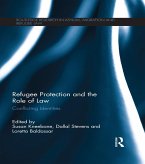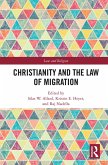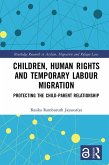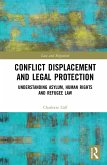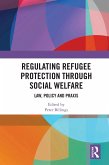Are Human Rights for Migrants? (eBook, ePUB)
Critical Reflections on the Status of Irregular Migrants in Europe and the United States
Redaktion: Dembour, Marie-Benedicte; Kelly, Tobias
53,95 €
53,95 €
inkl. MwSt.
Sofort per Download lieferbar

27 °P sammeln
53,95 €
Als Download kaufen

53,95 €
inkl. MwSt.
Sofort per Download lieferbar

27 °P sammeln
Jetzt verschenken
Alle Infos zum eBook verschenken
53,95 €
inkl. MwSt.
Sofort per Download lieferbar
Alle Infos zum eBook verschenken

27 °P sammeln
Are Human Rights for Migrants? (eBook, ePUB)
Critical Reflections on the Status of Irregular Migrants in Europe and the United States
Redaktion: Dembour, Marie-Benedicte; Kelly, Tobias
- Format: ePub
- Merkliste
- Auf die Merkliste
- Bewerten Bewerten
- Teilen
- Produkt teilen
- Produkterinnerung
- Produkterinnerung

Bitte loggen Sie sich zunächst in Ihr Kundenkonto ein oder registrieren Sie sich bei
bücher.de, um das eBook-Abo tolino select nutzen zu können.
Hier können Sie sich einloggen
Hier können Sie sich einloggen
Sie sind bereits eingeloggt. Klicken Sie auf 2. tolino select Abo, um fortzufahren.

Bitte loggen Sie sich zunächst in Ihr Kundenkonto ein oder registrieren Sie sich bei bücher.de, um das eBook-Abo tolino select nutzen zu können.
Are Human Rights for Migrants? Critical Reflections on the Status of Irregular Migrants in Europe and the United States examines upon the possibilities and limitations which arise from approaching the situation of migrants in human rights terms.
- Geräte: eReader
- mit Kopierschutz
- eBook Hilfe
- Größe: 1.33MB
Andere Kunden interessierten sich auch für
![Refugee Protection and the Role of Law (eBook, ePUB) Refugee Protection and the Role of Law (eBook, ePUB)]() Refugee Protection and the Role of Law (eBook, ePUB)47,95 €
Refugee Protection and the Role of Law (eBook, ePUB)47,95 €![Migration Law, Policy and Human Rights (eBook, ePUB) Migration Law, Policy and Human Rights (eBook, ePUB)]() Rachael DicksonMigration Law, Policy and Human Rights (eBook, ePUB)44,95 €
Rachael DicksonMigration Law, Policy and Human Rights (eBook, ePUB)44,95 €![Christianity and the Law of Migration (eBook, ePUB) Christianity and the Law of Migration (eBook, ePUB)]() Christianity and the Law of Migration (eBook, ePUB)44,95 €
Christianity and the Law of Migration (eBook, ePUB)44,95 €![Children, Human Rights and Temporary Labour Migration (eBook, ePUB) Children, Human Rights and Temporary Labour Migration (eBook, ePUB)]() Rasika JayasuriyaChildren, Human Rights and Temporary Labour Migration (eBook, ePUB)0,00 €
Rasika JayasuriyaChildren, Human Rights and Temporary Labour Migration (eBook, ePUB)0,00 €![Conflict Displacement and Legal Protection (eBook, ePUB) Conflict Displacement and Legal Protection (eBook, ePUB)]() Charlotte LülfConflict Displacement and Legal Protection (eBook, ePUB)42,95 €
Charlotte LülfConflict Displacement and Legal Protection (eBook, ePUB)42,95 €![Regulating Refugee Protection Through Social Welfare (eBook, ePUB) Regulating Refugee Protection Through Social Welfare (eBook, ePUB)]() Regulating Refugee Protection Through Social Welfare (eBook, ePUB)43,95 €
Regulating Refugee Protection Through Social Welfare (eBook, ePUB)43,95 €![The Crimmigrant Other (eBook, ePUB) The Crimmigrant Other (eBook, ePUB)]() Katja FrankoThe Crimmigrant Other (eBook, ePUB)40,95 €
Katja FrankoThe Crimmigrant Other (eBook, ePUB)40,95 €-
-
-
Are Human Rights for Migrants? Critical Reflections on the Status of Irregular Migrants in Europe and the United States examines upon the possibilities and limitations which arise from approaching the situation of migrants in human rights terms.
Dieser Download kann aus rechtlichen Gründen nur mit Rechnungsadresse in A, B, BG, CY, CZ, D, DK, EW, E, FIN, F, GR, HR, H, IRL, I, LT, L, LR, M, NL, PL, P, R, S, SLO, SK ausgeliefert werden.
Produktdetails
- Produktdetails
- Verlag: Taylor & Francis eBooks
- Seitenzahl: 264
- Erscheinungstermin: 1. Juni 2011
- Englisch
- ISBN-13: 9781136700071
- Artikelnr.: 38271964
- Verlag: Taylor & Francis eBooks
- Seitenzahl: 264
- Erscheinungstermin: 1. Juni 2011
- Englisch
- ISBN-13: 9781136700071
- Artikelnr.: 38271964
- Herstellerkennzeichnung Die Herstellerinformationen sind derzeit nicht verfügbar.
Marie-Bénédicte Dembour is Professor of Law and Anthropology at the University of Sussex. She has written extensively on human rights, culture and migration. She is the author of the acclaimed monograph 'Who Believes in Human Rights: Reflections on the European Convention' (CUP 2006). Tobias Kelly currently teaches Social Anthropology at the University of Edinburgh. He is the author of 'Law Violence and Sovereignty Amongst West Bank Palestinians' (CUP, 2006) and 'This Side of Silence: Human rights, Torture and the Recognition of Cruelty' (UPenn Press, forthcoming).
Introduction, Marie-Bénédicte Dembour and Tobias Kelly; Part I: Taking it
as a given: The affirmation of the optimist; 1. The Recognition of the
Rights of Migrants within the UN Human Rights System: the First SixtyYears,
Stefanie Grant; 2. Irregular Migration and Frontier Deaths: Acknowledging a
Right to Identity, Stefanie Grant; Part II: Deliberating: The efforts of
those who work the system; 3. The Constitutional Status of Irregular
Migrants: Testing the Boundaries of Human Rights Protection in Spain and
the United States, Cristina Rodriguez and Ruth Rubio Marin; 4. The Human
Rights of Migrants as Legal tools and Discursive Principles for Re-Framing
Individual Justice in Modern Constitutionalism, Galina Cornelisse; Part
III: Protesting: The outrage of the witness; 5. 'Not our problem': Why the
conditions of irregular migrants in detention are not considered a human
rights issue in Malta, Daniela De Bono; 6. The Calaisis area: transit zone
or dead-end?, Marie Martin; Part IV: Keeping one's distance: The puzzlement
of the sceptic; 7. Human Rights and Immigration Detention in the UK, Mary
Bosworth; 8. The Legalisation of Human Rights and the Protection of Torture
Survivors: Asylum, Evidence and Disbelief, Tobias Kelly; 9. The Rights of
the Person: a Constitutional Agenda Drawn from the US Experience, Linda
Bosniak; 10. Afterword, Upendra Baxi
as a given: The affirmation of the optimist; 1. The Recognition of the
Rights of Migrants within the UN Human Rights System: the First SixtyYears,
Stefanie Grant; 2. Irregular Migration and Frontier Deaths: Acknowledging a
Right to Identity, Stefanie Grant; Part II: Deliberating: The efforts of
those who work the system; 3. The Constitutional Status of Irregular
Migrants: Testing the Boundaries of Human Rights Protection in Spain and
the United States, Cristina Rodriguez and Ruth Rubio Marin; 4. The Human
Rights of Migrants as Legal tools and Discursive Principles for Re-Framing
Individual Justice in Modern Constitutionalism, Galina Cornelisse; Part
III: Protesting: The outrage of the witness; 5. 'Not our problem': Why the
conditions of irregular migrants in detention are not considered a human
rights issue in Malta, Daniela De Bono; 6. The Calaisis area: transit zone
or dead-end?, Marie Martin; Part IV: Keeping one's distance: The puzzlement
of the sceptic; 7. Human Rights and Immigration Detention in the UK, Mary
Bosworth; 8. The Legalisation of Human Rights and the Protection of Torture
Survivors: Asylum, Evidence and Disbelief, Tobias Kelly; 9. The Rights of
the Person: a Constitutional Agenda Drawn from the US Experience, Linda
Bosniak; 10. Afterword, Upendra Baxi
Introduction, Marie-Bénédicte Dembour and Tobias Kelly; Part I: Taking it
as a given: The affirmation of the optimist; 1. The Recognition of the
Rights of Migrants within the UN Human Rights System: the First SixtyYears,
Stefanie Grant; 2. Irregular Migration and Frontier Deaths: Acknowledging a
Right to Identity, Stefanie Grant; Part II: Deliberating: The efforts of
those who work the system; 3. The Constitutional Status of Irregular
Migrants: Testing the Boundaries of Human Rights Protection in Spain and
the United States, Cristina Rodriguez and Ruth Rubio Marin; 4. The Human
Rights of Migrants as Legal tools and Discursive Principles for Re-Framing
Individual Justice in Modern Constitutionalism, Galina Cornelisse; Part
III: Protesting: The outrage of the witness; 5. 'Not our problem': Why the
conditions of irregular migrants in detention are not considered a human
rights issue in Malta, Daniela De Bono; 6. The Calaisis area: transit zone
or dead-end?, Marie Martin; Part IV: Keeping one's distance: The puzzlement
of the sceptic; 7. Human Rights and Immigration Detention in the UK, Mary
Bosworth; 8. The Legalisation of Human Rights and the Protection of Torture
Survivors: Asylum, Evidence and Disbelief, Tobias Kelly; 9. The Rights of
the Person: a Constitutional Agenda Drawn from the US Experience, Linda
Bosniak; 10. Afterword, Upendra Baxi
as a given: The affirmation of the optimist; 1. The Recognition of the
Rights of Migrants within the UN Human Rights System: the First SixtyYears,
Stefanie Grant; 2. Irregular Migration and Frontier Deaths: Acknowledging a
Right to Identity, Stefanie Grant; Part II: Deliberating: The efforts of
those who work the system; 3. The Constitutional Status of Irregular
Migrants: Testing the Boundaries of Human Rights Protection in Spain and
the United States, Cristina Rodriguez and Ruth Rubio Marin; 4. The Human
Rights of Migrants as Legal tools and Discursive Principles for Re-Framing
Individual Justice in Modern Constitutionalism, Galina Cornelisse; Part
III: Protesting: The outrage of the witness; 5. 'Not our problem': Why the
conditions of irregular migrants in detention are not considered a human
rights issue in Malta, Daniela De Bono; 6. The Calaisis area: transit zone
or dead-end?, Marie Martin; Part IV: Keeping one's distance: The puzzlement
of the sceptic; 7. Human Rights and Immigration Detention in the UK, Mary
Bosworth; 8. The Legalisation of Human Rights and the Protection of Torture
Survivors: Asylum, Evidence and Disbelief, Tobias Kelly; 9. The Rights of
the Person: a Constitutional Agenda Drawn from the US Experience, Linda
Bosniak; 10. Afterword, Upendra Baxi

